 In the recent movie, “Swing Vote,” Kevin Costner stars as Bud Johnson, an apathetic loser who through a wacky chain of events somehow becomes the guy who will cast the vote to decide a presidential election.
In the recent movie, “Swing Vote,” Kevin Costner stars as Bud Johnson, an apathetic loser who through a wacky chain of events somehow becomes the guy who will cast the vote to decide a presidential election.
Suddenly, Bud Johnson — the nobody — becomes the voice for everybody.
The plot may seem unlikely as elections rarely come down to a single vote. But what if 10 people decide their individual votes don’t count? What if 100 people thought that way?
In the 2000 presidential election, Florida’s 24 electoral votes were decided by 537 votes in favor of current President George W. Bush. About 6 million Floridians cast votes that year. That’s equivalent to a race in Nebraska being decided by about 101 votes out of the approximately 1,133,000 potential voters. Suddenly that one vote seems a bit more significant, doesn’t it?
“One vote does make a difference,” said Barbara Tripp, voter service chairwoman and past-president of the non-partisan League of Women Voters of Greater Omaha. “There are several races when the winner is decided in fewer than 10 votes.”
Tripp recalls a 1990 recount to determine a Democratic candidate for Nebraska governor. Two of the nominees finished just 94 votes apart.
“Whoever holds public office can affect what happens to us in everyday life, so I think it’s important to exercise the right to vote,” Tripp said. “Not everybody has that privilege. Women have only had it since 1920.”
Discussions about political apathy often focus on the young, poor or people of certain races. But apathy’s roots reach some unexpected places.
|
Those statistics come as a surprise considering elected officials help set policy on the following issues that directly affect both current and future health professionals:
- National Institutes of Health (NIH) funding;
- Increasing costs of health care;
- Medicare physician payment reform;
- Medical liability reform;
- Health care reform;
- Expanding coverage for the uninsured;
- Student loans;
- Social Security;
- Increasing access to care;
- Implementation of electronic health records;
- Health care professional shortages, including nurse and nurse faculty and professionals in rural areas;
- A potential affirmative action ban and other measures affecting diversity in education and the workforce; and
- Other federal agency funding such as the Department of Health and Human Services, Department of Defense and the National Science Foundation.
To help encourage people to vote in the upcoming election, the League of Women Voters, which works to encourage informed voting in local elections and increase understanding of major public policy issues, will be on the UNMC campus on Tuesday, Oct. 7.
That day, they will offer all Nebraska residents the opportunity to:
- Register to vote;
- Re-register to vote in the event of a name, address or political party affiliation change; and/or
- Request an absentee/early voter ballot and receive a voter guide with information on the candidates and their stances on ballot initiatives.
The league members will be on the third floor of the University Tower outside the Nebraska Cafe and in the Alumni Commons of the Sorrell Center from 11:30 a.m. to 1:30 p.m.